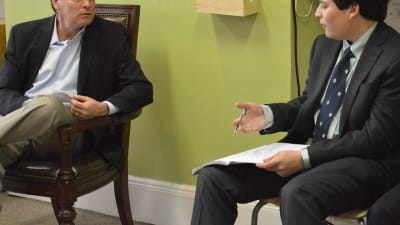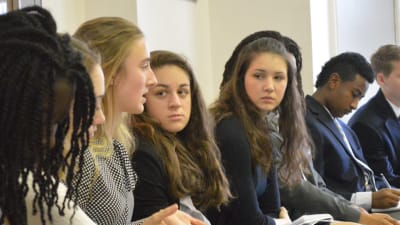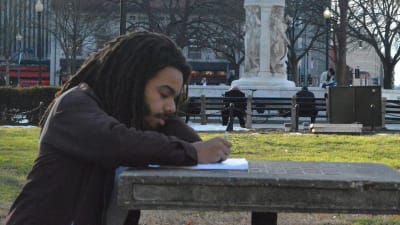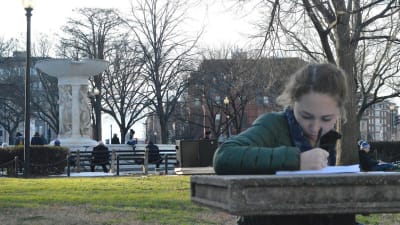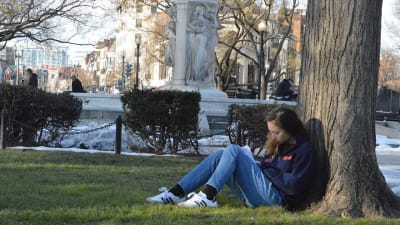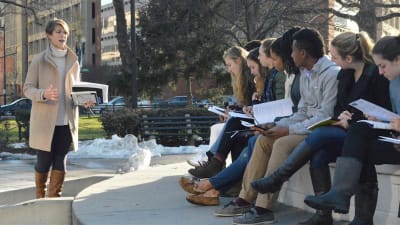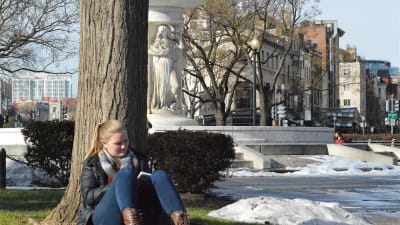Confronting Genocide: A week of extraordinary visits
How do we recognize and respond to the roots of genocide? How do we confront genocide when it happens? Before it happens? After it happens? These weighty questions inspired our second case study of the semester, and inspired our students toward new reflections, new conversations, and new choices.
Our exploration began last Friday evening with a viewing of the PBS Frontline documentary Ghosts of Rwanda. The Friday-evening viewing is an SEGL tradition–it marks the end of the first week’s “settling in” and the beginning of the difficult leadership work that is an SEGL semester. The film documents the 1994 Rwandan genocide and the world’s response (or lack of a response), and examines many of the ethical choices made during the conflict. The discussion that followed was intense, thoughtful, and forward-looking, and continued long after the official end of the conversation.
Three of the leaders featured in the documentary are longtime SEGL guest speakers, and we met with two of them this week. (The third will meet with the students later this month.) First up was Carl Wilkens, a former Adventist missionary who was the head of his church’s relief mission in Rwanda during the genocide. He was the only American to stay behind in 1994, and is most well-known for (among other acts) saving an entire orphanage from Interahamwe machetes. To SEGL graduates, he is a winner of our coveted “Golden Mug” award, which our graduates give to the speaker who has made the biggest difference in their lives.
Wilkens videoconferenced with the students from Venezuela, where he was visiting to do anti-genocide work (he is the founder of World Outside My Shoes, a genocide prevention NGO). The students asked him a wide range of questions–some personal, some political–and listened intently as he carefully and thoroughly addressed each one.
(Carl will become an honorary SEGL teacher this summer when we visit Rwanda with him. To learn more about the trip, visit our SEGL in Rwanda page.)
On Monday, we traveled to the United States Institute of Peace to meet with USIP Board Vice Chair George Moose. Moose has had a storied diplomatic career, including serving as U.S Ambassador to several countries; we speak with him in part because he was Assistant U.S. Secretary of State for Africa during the genocide. Before he spoke, we met with USIP’s Ann Louise Colgan, who heads the Institute’s Global Peacebuilding Center. She explained USIP’s educational mission and shared resources with students hoping to work against genocide.
Then Moose took the stage, answering challenging questions from students about the U.S. role, the pros and cons of bureaucracy, and his reflections on lessons learned from Rwanda. As he spoke, the students recognized a different style of speaking: Whereas Wilkens is an activist, Moose is a distinguished diplomat. Each position can create good in the world, and each position requires a different presentation style. Thinking about the limitations and power of each role, as well as the style needed to carry out each role effectively, will help our students craft their ideal career paths.
On Wednesday we arrived at the U.S Holocaust Memorial Museum before it opened to the general public for a special tour. (Thanks to SEGL board member Jesse Nickelson for this opportunity!) With two Holocaust survivors as guides, we made our way through the main exhibition quietly and intently. We spent special time focusing on the roots of the 20th century’s most notorious genocide: what small steps led to such a huge tragedy?
On Thursday, we returned to the Museum for another special session: an opportunity to hear Prince Zeid Ra’ad al-Hussein of Jordan, the current UN High Commissioner for Human Rights. (Thanks again to Nickelson for ensuring we could attend the small standing-room-only event.) After he spoke, he took six questions; two were front SEGL students. (You can watch the entire event here; the SEGL student questions are at 51:50 and 57:40–note that the High Commissioner took three questions at a time.)
Next week, we confront the Israeli-Palestinian Conflict.

